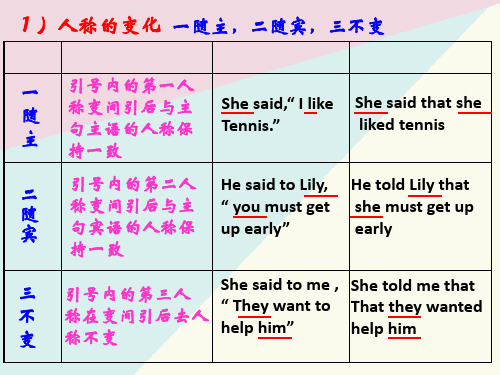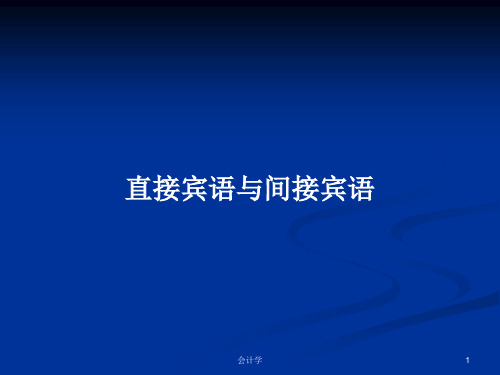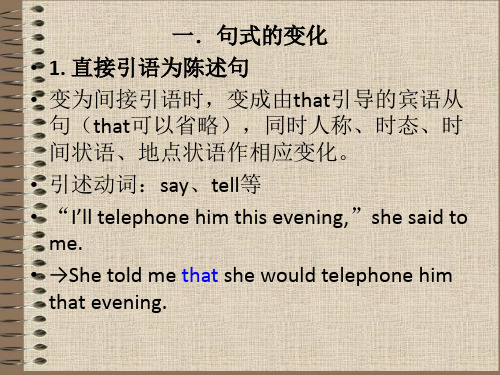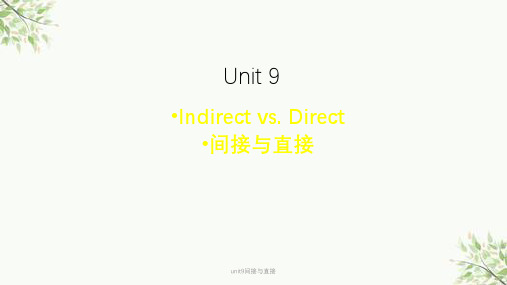九年级英语 直接宾语和间接宾语的总结及应用的课件
合集下载
直接宾语和间接宾语全 共29页

you are a teacher
They asked him Whether/if you are a teacher.
he was
They asked him whether he was a teacher.
2.一般疑问句直接引语变间接引语
“Are you at home yesterday?” She asked me Whether / if I was at home
the day before.
“Are you ready?” She asked me Whether / if I was ready.
Are you a teacher? ( They asked him )
1." We want you to take a message for her." said the Greens.
The Greens told me that theywanted me to take a message for her.
2."Are you willing to lend us a hand?" she said to him.
引号内的第三人
She said to me , “ They want to
不 称在变间引后去人 help d that she liked tennis
He told Lily that she must get up early
She told me that That they wanted help him
1)人称的变化 一随主,二随宾,三不变
一 随 主
引号内的第一人 称变间引后与主 句主语的人称保 持一致
She said,“ I like Tennis.”
They asked him Whether/if you are a teacher.
he was
They asked him whether he was a teacher.
2.一般疑问句直接引语变间接引语
“Are you at home yesterday?” She asked me Whether / if I was at home
the day before.
“Are you ready?” She asked me Whether / if I was ready.
Are you a teacher? ( They asked him )
1." We want you to take a message for her." said the Greens.
The Greens told me that theywanted me to take a message for her.
2."Are you willing to lend us a hand?" she said to him.
引号内的第三人
She said to me , “ They want to
不 称在变间引后去人 help d that she liked tennis
He told Lily that she must get up early
She told me that That they wanted help him
1)人称的变化 一随主,二随宾,三不变
一 随 主
引号内的第一人 称变间引后与主 句主语的人称保 持一致
She said,“ I like Tennis.”
直接引语和间接引语(19张PPT)初中英语专项复习课件

直接引语变间接引语
一、直接引语&间接引语 – 定义 二、句子结构变化规则 三、语序变化规则 四、人称变化规则 五、时态变化规则 六、指代状动变化规则
一、直接引语 间接引语 -- 定义
直接引语:引用别人的原话; Peter said “ Jack is a Bully!” 间接引语:用自己的话转述别人的话(宾语从句) Peter said that Jack was a Bully.
She said, “ I broke your phone.” She said that she _h_a_d_b_r_o_k_e_n my phone.
现在完成时→ 过去完成时
She said, “ He has gone home.” She said that he __h_a_d_g_o_n_e__ home.
go take have to
六、指代状动变化规则
5变: 指代状动
指示代词 时间状语 地点状语
this→that; these→those
now→then; today→that day; yesterday→the day before last week→the week before; tomorrow→the next day
一般现在时→ 一般过去时
He said, “ I know it.” He said that hek_n_e_w it.
现在进行时→ 过去进行时
He said, “ I am drinking milk.” He said that he _w_a_s_d_r_in_k_i_ng_ milk.
一般过去时→过去完成时
• 4.The teacher said, “The sun is bigger than the moon.”
一、直接引语&间接引语 – 定义 二、句子结构变化规则 三、语序变化规则 四、人称变化规则 五、时态变化规则 六、指代状动变化规则
一、直接引语 间接引语 -- 定义
直接引语:引用别人的原话; Peter said “ Jack is a Bully!” 间接引语:用自己的话转述别人的话(宾语从句) Peter said that Jack was a Bully.
She said, “ I broke your phone.” She said that she _h_a_d_b_r_o_k_e_n my phone.
现在完成时→ 过去完成时
She said, “ He has gone home.” She said that he __h_a_d_g_o_n_e__ home.
go take have to
六、指代状动变化规则
5变: 指代状动
指示代词 时间状语 地点状语
this→that; these→those
now→then; today→that day; yesterday→the day before last week→the week before; tomorrow→the next day
一般现在时→ 一般过去时
He said, “ I know it.” He said that hek_n_e_w it.
现在进行时→ 过去进行时
He said, “ I am drinking milk.” He said that he _w_a_s_d_r_in_k_i_ng_ milk.
一般过去时→过去完成时
• 4.The teacher said, “The sun is bigger than the moon.”
直接宾语与间接宾语PPT学习教案

第10页/共32页
2.verb+sb+sth=verb + sth. +for + sb. 这类动词后面的间接宾语后置时,间接宾语 前要用介词for。
Fetch us a few chairs, will you? →Fetch a few chairs for us, will you?
给我们搬几把椅子来,行吗?
Shall I prepare anything special for them?
Fetch a few chairs for us,ok?
第16页/共32页
3.verb +sth. + of/with + sb. 这类动词后面的间接宾语后置时,间接宾语 前用介词of/with等,个别间接宾语前也有 用其他介词的。 注意识记这些特殊的动词。例如: ask sth. of sb. play sth. with sb.
第12页/共32页
常见的这类动词有:
make (制造), buy, do, fetch (取 来), get, paint , draw (绘画), play (弹,奏), save (节约,省下) , reserve (保留,预定), spare ( 抽出),order (定购), cook (烹调 ), sing, find , build, change, choose, prepare,pick等。
10.My coach brought me a bottle of water.
第29页/共32页
11.My coach gave every team member a swimming-suit. 12.People gave me many prizes
2.verb+sb+sth=verb + sth. +for + sb. 这类动词后面的间接宾语后置时,间接宾语 前要用介词for。
Fetch us a few chairs, will you? →Fetch a few chairs for us, will you?
给我们搬几把椅子来,行吗?
Shall I prepare anything special for them?
Fetch a few chairs for us,ok?
第16页/共32页
3.verb +sth. + of/with + sb. 这类动词后面的间接宾语后置时,间接宾语 前用介词of/with等,个别间接宾语前也有 用其他介词的。 注意识记这些特殊的动词。例如: ask sth. of sb. play sth. with sb.
第12页/共32页
常见的这类动词有:
make (制造), buy, do, fetch (取 来), get, paint , draw (绘画), play (弹,奏), save (节约,省下) , reserve (保留,预定), spare ( 抽出),order (定购), cook (烹调 ), sing, find , build, change, choose, prepare,pick等。
10.My coach brought me a bottle of water.
第29页/共32页
11.My coach gave every team member a swimming-suit. 12.People gave me many prizes
直接引语和间接引语(15张PPT)初中英语专项复习课件

相应的变化
→He asked me if I had a computer.
他问我是否有计算机。
用法
举例
Bill said, “She is my elder sister. ” →Bill said that she was his elder sister. 比尔说她是他的姐姐。
第三人称不更新 The teacher told Mary’s parents, “Mary is
直接引语中的第三 a good girl. She is always ready to help 人称在间接引语中 others. ”
不发生变化
→The teacher told Mary’s parents that
Mary was a good girl and she was always
ready to help others.
老师问我是否会游泳。
用法
例句
(3) 如 果 直 接 引 语
是特殊疑问句,要 “What are you doing? ”my father asked.
用 相 应 的 疑 问 词 →My father asked what I was doing.
who, whom, whose, 爸爸问我在做什么。
过去将来时
例句
Nina told me, “Linda is watching TV at home. ”→Nina told me (that) Linda was watching TV at home. 尼娜告诉我琳达正在家看电视。
She said, “I will see you at the same place tomorrow. ”
(三)指示代词、时间和地点等变化
直接宾语和间接宾语全课件

1
Practice:
1) He said,“My brother failed in the exam.” He said __h_i_sbrother had failed in the exam.
2) He said to Mary,“ How is your mother now?” he asked Mary how ___h_e_rmother was then.
She asked him whether he was willing to lend them a hand.
3
由直接引语转变为间接引语,下列情况 时态不变:
1. 不变的真理 The teacher said to the students, “Water freezes when the temperature falls below 0 ℃.” → The teacher told the students that water freezes when the temperature falls below 0 ℃.
3)My teacher said, ‘‘she is a good student. '' My teacher said ___sh_we as a good student
4) He said to me,“I've left her book in your room” He told me that __h_ehad left __h_ebrook in ___my room.
She asked me Whether / if I was at home the day before.
12
“Are you ready?”
直接宾语和间接宾语 ppt课件

根据可接双宾语的动词所搭配的介 词,可以分为两种常见情形:
2.动词+间接宾语+直接宾语=动词+直接宾语 +for+间接宾语
verb.+sb.+sth.=verb.+ sth.+for+ sb. 这类动词后面的间接宾语后置时,间接宾语 前要用介词“for”。 比如:我的爸爸给我买了一个书包。
My father buy me a bag. →My father buy a bag for me. 常见的这类动词还有: make,do,get, paint,draw,play,save,order, sing, change, choose,prepare等。
比如:Please give the book to m呼老师?
• 如果老师最后没有总结一节课的重点的难点,你 是否会认为老师的教学方法需要改进?
• 你所经历的课堂,是讲座式还是讨论式? • 教师的教鞭
• “不怕太阳晒,也不怕那风雨狂,只怕先生骂我 笨,没有学问无颜见爹娘 ……”
直接宾语和间接宾语 direct object&indirect object
~By Eli
直接宾语和间接宾语的定义
直接宾语表示动 作的承受者,一 般是物。
比如:Please give the book to me.
直接宾语就是 “the book” 。
间接宾语表示动 作是对谁或者为 谁而做的,一般 是人。
• “太阳当空照,花儿对我笑,小鸟说早早早……”
根据可接双宾语的动词所搭配的介 词,可以分为两种常见情形:
1.动词+间接宾语+直接宾语=动词+直接宾语 +to+间接宾语
直接引语与间接引语ppt最全课件

problem.
经营者提供商品或者服务有欺诈行为 的,应 当按照 消费者 的要求 增加赔 偿其受 到的损 失,增 加赔偿 的金额 为消费 者购买 商品的 价款或 接受服 务的费 用
2024/2/17
直接引语 一般现在时 一般将来时 一般过去时 现在进行时 现在完成时 过去完成时 现在完成进行时
can may must
经营者提供商品或者服务有欺诈行为 的,应 当按照 消费者 的要求 增加赔 偿其受 到的损 失,增 加赔偿 的金额 为消费 者购买 商品的 价款或 接受服 务的费 用
二.人称的变化
• 直接引语中的人称代词转化为间接引语时变化原 则:一随主,二随宾,第三人称不更新。
• They told Mary,“We will help you out of trouble.” • They told Mary that they will help her out of trouble.
Practice
• She said. "My brother wants to go with me." • He said to Kate. "How is your sister now?" • Mr. Smith said: "Jack is a good worker。"
经营者提供商品或者服务有欺诈行为 的,应 当按照 消费者 的要求 增加赔 偿其受 到的损 失,增 加赔偿 的金额 为消费 者购买 商品的 价款或 接受服 务的费 用
here come bring
there go take
经营者提供商品或者服务有欺诈行为 的,应 当按照 消费者 的要求 增加赔 偿其受 到的损 失,增 加赔偿 的金额 为消费 者购买 商品的 价款或 接受服 务的费 用
经营者提供商品或者服务有欺诈行为 的,应 当按照 消费者 的要求 增加赔 偿其受 到的损 失,增 加赔偿 的金额 为消费 者购买 商品的 价款或 接受服 务的费 用
2024/2/17
直接引语 一般现在时 一般将来时 一般过去时 现在进行时 现在完成时 过去完成时 现在完成进行时
can may must
经营者提供商品或者服务有欺诈行为 的,应 当按照 消费者 的要求 增加赔 偿其受 到的损 失,增 加赔偿 的金额 为消费 者购买 商品的 价款或 接受服 务的费 用
二.人称的变化
• 直接引语中的人称代词转化为间接引语时变化原 则:一随主,二随宾,第三人称不更新。
• They told Mary,“We will help you out of trouble.” • They told Mary that they will help her out of trouble.
Practice
• She said. "My brother wants to go with me." • He said to Kate. "How is your sister now?" • Mr. Smith said: "Jack is a good worker。"
经营者提供商品或者服务有欺诈行为 的,应 当按照 消费者 的要求 增加赔 偿其受 到的损 失,增 加赔偿 的金额 为消费 者购买 商品的 价款或 接受服 务的费 用
here come bring
there go take
经营者提供商品或者服务有欺诈行为 的,应 当按照 消费者 的要求 增加赔 偿其受 到的损 失,增 加赔偿 的金额 为消费 者购买 商品的 价款或 接受服 务的费 用
直接宾语变间接宾语课件

④直接引语如果是祈使句,间接引语应改为“ 直接引语如果是祈使句,间接引语应改为“ Tell (ask, order, beg等) sb (not) to do sth.”句型 。 等 句型 如: 1."Don't make any noise," the teacher said to the students. →She told (ordered) the students not to make any noi se. 2.“Open the door, please," said she. →She asked him to open the door. 开头的祈使句, ⑤直接引语如果是以“Let's”开头的祈使句,变为间 直接引语如果是以“ 开头的祈使句 接引语时,通常用“ 动句词( 接引语时,通常用“suggest +动句词(或从句)” 动句词 或从句) 如: He said, "Let's go to the movies." →He suggested going to the movies. 或He suggested that they should go to see the movies.
一般将来时----( 过去将来时) 一般将来时 ( 过去将来时)
She said ,“I am reading a book.” →She said she was reading a book.
现在进行时-----( 过去进行时 ( 现在进行时
)
直接引语 一般现在时 一般将来时 现在进行时 一般过去时 现在完成时 过去完成时 can may
注意: 注意:以下几种情况时态 不变 The teacher said "The earth moves around the sun .” → The teacher said the earth moves around the sun . 直接引语是客观真理 客观真理。 ①直接引语是客观真理。 Jack said. “I was doing chores when Tom came to see me” →Jack said he was doing chores when Tom came to see him. ②直接引语是过去进行时,时态不变。 直接引语是过去进行时,时态不变。 过去进行时 Jack said. "I was born on April 2l, 1980." →Jack said he was born on April 21, 1980. 直接引语中有具体的过去某年 某月、某日作状语 某年、 作状语, ③直接引语中有具体的过去某年、某月、某日作状语, 变为间接引语时,时态不变。 变为间接引语时,时态不变。
直接宾语和间接宾语

用法异同
相同点
两者都可以作为动词的宾语,表示动作的对象。
不同点
直接宾语强调动作的直接性,而间接宾语强调动作对其他人的影响或结果。
ቤተ መጻሕፍቲ ባይዱ
转换与辨析
转换
在某些情况下,直接宾语和间接宾语 可以相互转换,但语义会有所变化。
辨析
在句子中,可以通过上下文、语境和 语义来判断是使用直接宾语还是间接 宾语。
05
练习与巩固
直接宾语和间接宾语
目录
• 引言 • 直接宾语 • 间接宾语 • 直接宾语与间接宾语的比较 • 练习与巩固
01
引言
定义与分类
定义
宾语是句子中的受事成分,表示动作 行为直接的承受者。根据宾语在句子 中的语法功能,可以分为直接宾语和 间接宾语。
分类
直接宾语表示动作行为直接的承受者 ,通常紧跟在动词之后;间接宾语表 示动作行为间接的承受者,通常紧跟 在动词之后,放在直接宾语之前。
即动作是给某人一本书。
示例2
我为她做了一顿饭。(这里的 "她"是间接宾语,"一顿饭"是
直接宾语。)
解析
这个句子中的"她"表示动作行 为对某人产生的影响或结果, 即动作是为某人做了一顿饭。
04
直接宾语与间接宾语的比 较
语义差异
直接宾语
表示动作的直接承受者,通常指代动作所涉及的具体对象。
间接宾语
表示动作的非直接承受者,通常指代动作对其他人的影响或 结果。
解析
“我喜欢吃苹果”这个句子中,“吃”是谓语,“苹果”是直接宾语,表示“ 吃”的对象。
03
间接宾语
定义与特点
间接宾语是句子中除了直接宾语之外 的另一个重要的宾语,通常表示动作 行为对某人产生的影响或结果。
unit9间接与直接课件

unit9间接与直接二汉语的直接倾向以及特有的间接表达总体来看汉语表现风格倾向于直接简短明了但每种语言的特点通常都有两面性英汉间接与直接的表达法也是相对而言的这与言者的身份言辞的文体言语的目的对象时间地点等种种因素都有关系
Unit 9
•Indirect vs. Direct •间接与直接
unit9间接与直接
unit9间接与直接
• 3、学校委婉语。 • Cheat 作弊—— need help in learning to adhere to rules and
standards of fபைடு நூலகம்ir play • Steal 偷窃—— need help in learning to respect the property
• 1、低调陈述。以含蓄的语气故意把大事化小,用 轻描淡写的言辞来加深对方的印象,往往带有幽 默和冷嘲的味道:
• He had five sandwiches and a quart of milk for his
snack.
• 他吃了五个三明治,喝了一品脱牛奶,作为他的 小吃。
• 点评:五个三明治和一品脱牛奶仅仅是作为小吃, 那正餐又如何?这种低调的言辞带有幽默俏皮的 效果。
火球,衬着黑魆魆的山峰的背影,如论如何,是 会引起非人间的飘渺的思想的。(矛盾《雾) • Indeed, that neat formation of three dimly separate tiers of fireballs set off against the fearsome black
• 忽见东府里几个人,慌慌张张跑来,说:“老爷宾天了!” 众人听了,吓了一大跳,忙都说:好好的并无疾病,怎么 就没了!”家人说:“老爷天天修炼,定是功德圆满,升仙 去了。”(《红楼梦》)
Unit 9
•Indirect vs. Direct •间接与直接
unit9间接与直接
unit9间接与直接
• 3、学校委婉语。 • Cheat 作弊—— need help in learning to adhere to rules and
standards of fபைடு நூலகம்ir play • Steal 偷窃—— need help in learning to respect the property
• 1、低调陈述。以含蓄的语气故意把大事化小,用 轻描淡写的言辞来加深对方的印象,往往带有幽 默和冷嘲的味道:
• He had five sandwiches and a quart of milk for his
snack.
• 他吃了五个三明治,喝了一品脱牛奶,作为他的 小吃。
• 点评:五个三明治和一品脱牛奶仅仅是作为小吃, 那正餐又如何?这种低调的言辞带有幽默俏皮的 效果。
火球,衬着黑魆魆的山峰的背影,如论如何,是 会引起非人间的飘渺的思想的。(矛盾《雾) • Indeed, that neat formation of three dimly separate tiers of fireballs set off against the fearsome black
• 忽见东府里几个人,慌慌张张跑来,说:“老爷宾天了!” 众人听了,吓了一大跳,忙都说:好好的并无疾病,怎么 就没了!”家人说:“老爷天天修炼,定是功德圆满,升仙 去了。”(《红楼梦》)
- 1、下载文档前请自行甄别文档内容的完整性,平台不提供额外的编辑、内容补充、找答案等附加服务。
- 2、"仅部分预览"的文档,不可在线预览部分如存在完整性等问题,可反馈申请退款(可完整预览的文档不适用该条件!)。
- 3、如文档侵犯您的权益,请联系客服反馈,我们会尽快为您处理(人工客服工作时间:9:00-18:30)。
2)直接引语变间接引语时, 指示代词、时间状语、 地点状语等要作相应的变化。
(如:this/that→ these/those, now→then, today→that day, yesterday→the day before, last year→the year before, ago→before, here→there等。例如: He said, "I haven't seen her today."→ He said that he hadn't seen her that day.
一些注意事项 (1)直接引语是客观事实、普遍 真理等,变成间接引语时,时态不 变。. • 例如:
They told their son,"The earth goes round the sun."→ They told their son that the earth goes round the sun
一般将来时变为过去将来时
人称的变化:要根据句子 意思改变人称,如:I--he,she; we--they等等
• 三)指示代词、时间状语、地点状语的变 化: • this--that; these--those; now-then; yesterday--the day before; today--that day; tomorrow--the next day; • next week(month, year)--the next week(month,year); • ago--before; here--there.
直接引语变间接引语
引述别人的话时,一般采用两种方式:一是引用别人的原话, 把它放在引号内,称为直接引语间接引语就是用自己的话转 述别人的话,这叫作间接引语。应注意: (一)时态的变化:主句中的谓语动词如果是过去时态,直接 引语中的谓语动词的时态须做下列变化:
一般现在时变为一般过去时
1. He often says “ I shall tell you about them.” B He often tells me that _____ will tell _____ about ______. A. I…you…them B. he…me…them C. he…you…us D. I…me…you 2. You must say to her, “ I depend on you and him .” C You must tell her that _____ depend on ____ and _____. A. I…you…him B. she…you…me C. you…her…him D. you…me…him 3. I shall tell him, “ I have written to you and her twice.” A I shall tell him that _____ have written to _____ and ______ twice. A. I…him…her B. you…him…her C. I …you…me D. you…me…her 4. Jack said to me,” You look worried today.” Jack told me that __D. ___ worried _____. A. he looks…today B. you look…today C. we looked…that day B. D. I looked…that day 5. We said to her,” They’re walking through the street now.” We told her that ------ through the street C ______. A. we were walking…then B. you are walking…now C .they were walking…then D. they walking…now
12.. He said to his son “ Put on more clothes>” A.He told his son to put on more clothes B.He asked his son put on more clothes C.He said to his son that he would put on more clothes D.He told his son that he should put on more clo是祈使句,变成间接引语,把动词原形变成 动词不定式,并在动词不定前加tell, ask, order 的宾 语。句式….tell, ask, order sb to do
• 例如:The solider ordered:” Be quiet.”
The solider ordered us to be quiet. 注意:否定句,在动词不定式前加not My teacher asked me :” Don’t laugh .” My teacher asked me not to laugh
c
11.“Why didn’t you call me an hour ago ?” he said. D A.He asked me why I didn’t call him an hour ago B.He said why I hadn’t called him an hour before C.He asked why hadn’t I called him an hour before ? D.He asked why I hadn’t called him an hour before
8 The man said to me, “Please send for a doctor now !”
The man ____ C me _____ for a doctor. A. ordered…to send…then B. told …send…now C. asked…to send…then B. D. asked…send…now 9.I said to my daughter, ”Don’t make any mistakes in it .” I _____ my daughter +_____ any mistakes in it. C A. asked…don’t make B. ordered…didn’t make C. told…not to make B. D. told…to not make
6He said, “Do I have anything to do with her ?” He asked ____ C anything to do with _____> A. if did he have …me B. if he had…me C. whether he had…her D. whether he had…her
7 Jack said to her ,”Where do you spend your holidays ?”
A. she spend her
Jack asked her where ____ holidays. C B. you spend your C. she spent her D. you spent your
(但直接引语是客观事实、永恒真理,变成间接引语时, 时态不变。 例如:They told their son :”The earth goes round the sun.” They told their son that the earth goes round the sun.)。 现在进行时变为过去进行时; 现在完成时变为过去完成时; 一般过去时变为过去完成时; 过去完成时则不变,仍是过去完成时;
10. Would you like coffee or tea ?” asked Mother. Mother asked us ______. A. if I would like coffee and tea B. if would I like coffee or tea C. whether I would like coffee or tea D. whether would I like coffer or tea
She said, "I am very happy to help you."→ She said that she was very happy to help you.
2、直接引语是一般、选择或反问疑问句, 变成间接引语,由连词whether或if 引导。
• He asked me, "Do you like playing football?"→ • He asked me if/whether I liked playing football. • He asked me: “Do you come from China?” • He asked me if/whether I came from China.
• 例如:My sister asked me : “ What is your friend?” My sister asked me what your friend was. • My sister asked me, "How do you like the film?"→ • My sister asked me how I liked the film.
7I said to Jenny, “Are you getting on well with him now ?” B I asked Jenny _____ getting on well with him ____. A. whether was she …then B. if she was …then C. how was I …now B. D. how I was …now
